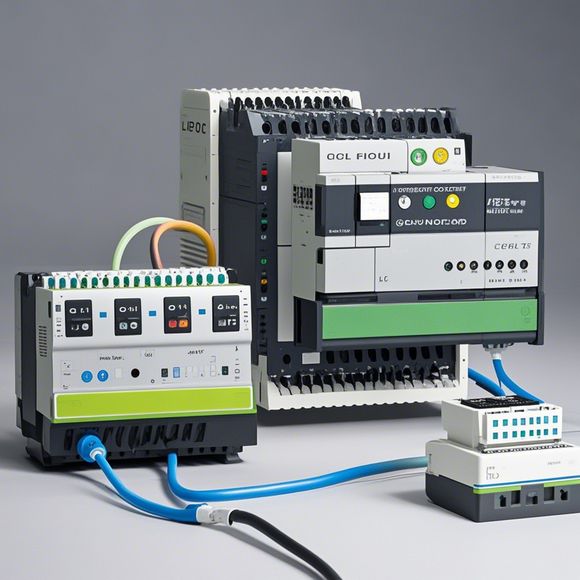PLC Control System Overview
PLC (Programmable Logic Controller) is a type of digital control system that allows the automation and optimization of industrial processes. Its primary function is to manage complex tasks such as temperature regulation, pressure control, and material handling. The PLC is designed to operate on a variety of programming languages and can be easily integrated with other types of equipment and systems.One key advantage of the PLC is its ability to process real-time data and make immediate decisions based on it. This enables the system to respond quickly and effectively to changing conditions, improving efficiency and safety in many industrial applications. Additionally, PLCs are highly reliable and can withstand harsh environments, making them ideal for use in harsh industrial conditions.Overall, the PLC Control System plays a crucial role in modern industrial processes by providing efficient and precise control over complex systems, enabling businesses to improve productivity, reduce downtime, and minimize costs.
Introduction to PLC (Programmable Logic Controller) Systems:

In the world of automation, PLC systems stand out as a cornerstone of industrial and manufacturing processes. These sophisticated control devices are designed to manage complex workflows by processing data and responding to changes in real-time. Whether you're dealing with simple tasks like turning on lights or more advanced operations such as automating production lines, PLCs have become an essential tool for many industries. In this guide, we'll explore the principles behind PLC control systems and discuss their applications.
What is a PLC?
PLCs, also known as Programmable Logic Controllers, are digital electronic controllers that can be programmed to carry out specific functions. They are versatile, reliable, and cost-effective solutions that can handle various types of tasks and processes. PLCs are designed to operate without human intervention and are capable of performing tasks that would otherwise require specialized equipment. This makes them ideal for industries where precise timing, high reliability, and ease of maintenance are critical factors.
The basic components of a PLC include:
1、Central Processing Unit: The brain of the PLC system, it processes the input signals and generates output signals based on the program instructions set in the user's memory.
2、Input/Output Devices: These devices receive input signals from other systems and send output signals to perform actions on external equipment.
3、Memory: It is used to store the user's program code and data for future reference.
4、I/O Interfaces: They connect PLC systems to other peripheral devices, allowing communication between the two.
5、Power Supply: It provides the necessary energy to power all components of the PLC system.
Applications of PLC systems:
PLCs are used in numerous industries due to their ability to handle complex tasks efficiently. Some popular application areas include:
1、Automotive Manufacturing: PLCs are used to control various systems in the automotive industry, including engine control, fuel injection, and brake systems.
2、Food Processing: These systems are used to monitor temperature, pressure, and other parameters during food processing operations. For example, in meat packaging plants, PLCs help control temperature settings and prevent contamination.
3、Manufacturing: They are used to control assembly line processes, including machine operation, material handling, and product inspection.
4、Health Care: PLCs are employed in hospitals to control lighting, air conditioning, elevator operations, and other critical systems. They can also be used to monitor patient data and assist in surgeries.

5、Retail Industry: PLC systems are used in retail stores to manage inventory tracking, cash register operations, and security systems. They can also be used to monitor customer behavior and optimize sales strategies.
6、Agriculture: In agricultural fields, PLCs are used to manage irrigation systems, fertilizer application, and pest control measures.
7、Energy Management: PLC systems can be used in energy-intensive industries like mining and oil drilling to monitor power usage, conserve energy, and reduce costs.
Advantages of PLC systems:
There are numerous advantages of using PLC systems in various industries. Here are just a few:
1、Cost-effectiveness: PLCs are affordable and offer significant savings in comparison to traditional mechanical systems. They require less space and maintenance, making them more economical in the long run.
2、High reliability: PLCs are built to last and provide reliable performance, even when subjected to harsh conditions. This ensures continuous operation without downtime or interruptions.
3、Efficiency: PLC systems are highly efficient, capable of operating at maximum capacity within tight timeframes. This leads to reduced production costs and improved profitability.
4、Scalability: PLC systems can be easily scaled up or down to meet changing demands. As technology advances, these systems can be customized to meet new requirements, ensuring long-term success.
5、Easy programming and maintenance: Programming PLC systems is relatively straightforward compared to other hardware systems. Additionally, they are easy to maintain, reducing the need for frequent repairs or replacements.
Conclusion:
In conclusion, PLC systems represent a vital aspect of modern industrial automation. Their ability to handle complex tasks efficiently and consistently, coupled with their flexibility, make them an indispensable tool for many industries. From automotive manufacturing to healthcare services, food processing to energy management, PLCs play a crucial role in driving progress and efficiency in today's world. By understanding their fundamental components and how to effectively utilize them, businesses can achieve greater success and productivity in their operations.
Content expansion reading:
Articles related to the knowledge points of this article:
PLC Programming for Automation Control in the Manufacturing Industry
How to Use a PLC Controller for Your Business
The Role of Programmable Logic Controllers (PLCs) in Foreign Trade Operations
PLC Controllers: A Comprehensive Guide to Understanding Their Prices